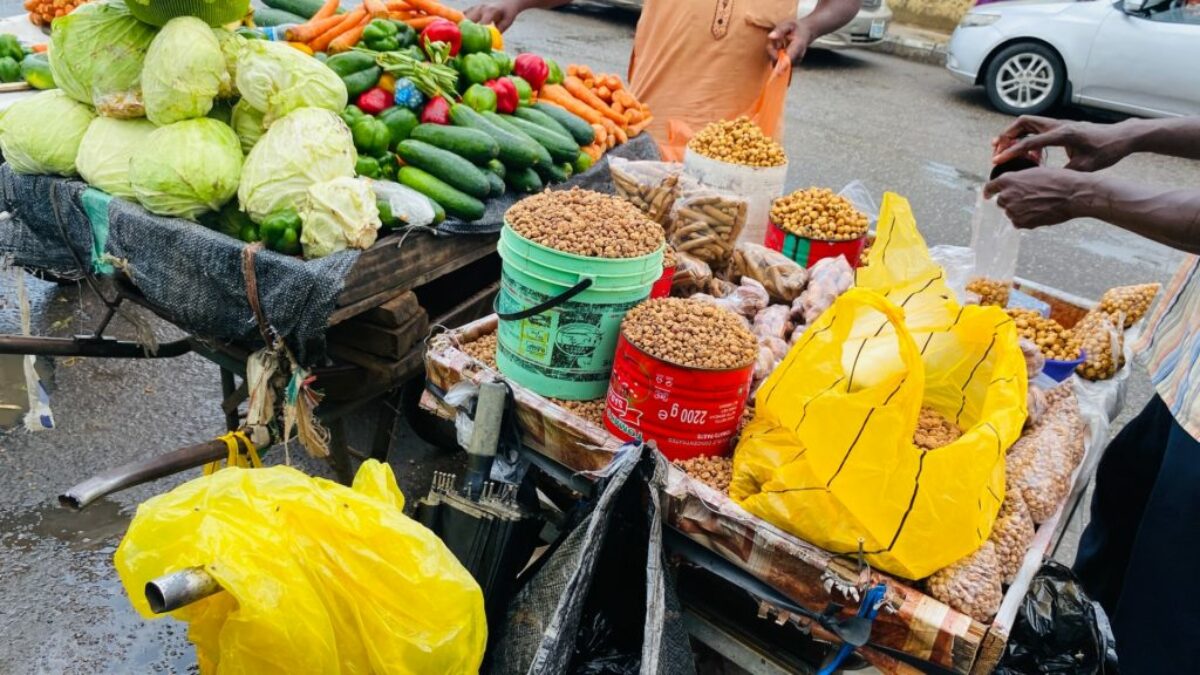Agriculture
Food and commodity price increases push Nigeria’s inflation rate to 19.64%.

The Consumer Price Index (CPI) which measures the rate of change in prices of goods and services in Nigeria increased to 19.64 percent in July, compared to the 1percent cent it was the previous month, the National Bureau of Statistics (NBS) disclosed yesterday.
However, on a year-on-year comparison, the CPI stood at 17.38 percent in the corresponding month of 2021.
The NBS attributed the 2.27 percent rise in the headline index to the uptick in the food and core indexes.
Food inflation rose by 0.99 percent to 22.02 percent year-on-year in July compared to 21.03 per cent in 2021.
According to the CPI report for July which was posted on the statistical agency’s website, the rise in food inflation was caused by increases in prices of bread and cereals, food products potatoes, yam and other tubers, meat, fish, oil, and fat.
On a month-on-month basis, food inflation declined by 0.01 per cent to 2.04 per cent in July, which was an insignificant reduction compared to 2.05 per cent.
READ ALSO: William Ruto wins Kenya presidential election
The NBS however attributed the decline to a reduction in the prices of some food items namely tubers, maize, garri, and vegetables.
The average annual rate of food inflation for the 12-month period ending July 2022, over the previous 12-month average was 18.75 per cent, which was a 1.42 per cent decline from the 20.16 per cent average annual rate of change recorded in July 2021.
Similarly, the “All items less farm produce’’ or Core inflation, which excludes the prices of volatile agricultural produce increased by 2.54 per cent to 16.26 per cent year-on-year compared to 13.72 per cent in 2021.
On a month-on-month basis, core inflation rose by 0.20 per cent to 1.75 per cent in July compared to 1.56 per cent recorded in June.
According to the statistical agency, the highest increases in core inflation were recorded in prices of gas, liquid fuel, solid fuel, passenger transport by road, air, garments, cleaning, repair and hire of clothing.
Meanwhile, year-on-year, food inflation was most severe in Kwara (29.28 per cent), Akwa Ibom (27.22 per cent), and Kogi (26.08 per cent), while Kaduna (17.16 per cent), Jigawa (17.46 per cent) and Anambra (19.25 per cent) recorded the slowest rise.
On a month-on-month basis, food inflation was highest in Kwara (3.90 per cent), Delta (3.61 per cent), and Benue (2.94 per cent), while Taraba (0.14 per cent), Gombe (0.94 per cent), and Niger (1.13 per cent) recorded the slowest rise.
On the other hand, core inflation year-on-year basis was highest in Akwa Ibom (22.88 per cent), Ebonyi (22.51 per cent), Kogi (22.08 per cent), while Jigawa (16.62 per cent), Kaduna (17.04 per cent) and Borno (18.04 per cent) recorded the slowest rise in the headline index.
Agriculture
Fintiri Unleashes N2bn Boost for Farmers as Adamawa Rolls Out 2025 Agricultural Support Programme

The Adamawa State Government has launched the 2025 Agricultural Support Programme aimed at empowering smallholder farmers and enhancing food security across the state.
Commissioner for Agriculture, Prof. David Jatau, disclosed this on Friday while briefing journalists in Yola. He revealed that Governor Ahmadu Umaru Fintiri had approved a substantial N2 billion for the initiative, which targets increased agricultural productivity in the upcoming farming season.
According to Jatau, the programme—which is already underway—will provide subsidised agricultural inputs such as fertilisers, improved seeds, and other essential materials to farmers in six local government areas.
“The programme has already commenced in six LGAs—Madagali, Michika, Hong, Maiha, Demsa, and Ganye,” he said. “By next year, during the rainy season, we will extend the programme to the remaining LGAs.”
He explained that 300 hectares of farmland would be cultivated in each of the participating local governments, with 300 farmers benefitting per council.
To ensure fairness and transparency, Jatau said a multi-stakeholder committee had been constituted to oversee the beneficiary selection process. The committee comprises representatives of traditional councils, local government authorities, security agencies, youth groups, and women organisations.
“We are also equipping extension workers with training to offer farmers guidance on modern agricultural techniques for improved yield,” he added.
The commissioner noted that the intervention would not only increase food production but also generate employment, improve rural incomes, and contribute to economic stability in farming communities.
Jatau also revealed that the state government is collaborating with non-governmental organisations and agricultural development bodies, with over 2,700 hectares of farmland pledged by development partners for cultivation.
He reaffirmed the Fintiri administration’s commitment to achieving food self-sufficiency and urged beneficiaries to make the most of the programme.
Agriculture
KWASU Microfinance Bank disburses loan to farmers

The Kwara State University (KWASU) Microfinance Bank has provided loan facilities to farmer groups in and around Malete, Moro Local Government Area.
The Vice-Chancellor and Chairman of the Board of Trustees, KWASU Microfinance Bank, Prof. Jimoh Shaykh-Luqman, announced this while presenting offer letters to the farmers’ associations at a formal event held on the university campus.
Addressing the farmers, the Vice-Chancellor, represented by the Deputy Vice-Chancellor (Administration), Prof. Moshood Jimba, said the agricultural loan scheme aimed to support farmers in boosting food production and enhancing food sustainability.
“The loan is meant to support your farm operations, especially in the upcoming planting season,” he said.
Prof. Shaykh-Luqman reaffirmed KWASU’s commitment to its mantra of being a “University for Community Development,” leveraging its expertise and resources to initiate programmes that drive local development.
The Managing Director and Chief Executive Officer of KWASU Microfinance Bank, Alhaji Hakeem Hassan, noted that the agricultural loan scheme was piloted last year with 15 farmers as beneficiaries.
He added that the pilot scheme yielded positive results for both the farmers and the bank, as all beneficiaries successfully repaid their loans.
Following this success, he said, the scheme had been expanded to include more farmers under various farmers’ associations.
The News Agency of Nigeria (NAN) reports that the associations benefiting from the agricultural loan scheme include Alanu Agbelere Farmers Group, Agbedola Ketere Group, and Itesiwaju Agbe Group Omoni.
Others are Agbeloba Farmers Association (Malete Market), Agbeyewa Elemere Farmers Group, Agbe Olofeere Group, and Agbeloga Malete Farmers Group.
Speaking on behalf of the farmers, the Chairman of Agbeloba Farmers Association (Malete Market), Alhaji Mohammed Abdulrazaq, expressed gratitude to the university and the bank for their trust.
He pledged, on behalf of the beneficiaries, to utilise the loans effectively and ensure prompt repayment.
Agriculture
Kano Govt. implements N2.3bn livestock empowerment programme

The Kano State Government has begun implementing the second phase of its livestock empowerment programme valued at N2.3bn under the Kano State Agro-Pastoral Development Project (KSADP).
The Commissioner for Agriculture and Natural Resources, Dr Mamood Danjuma, disclosed this while addressing newsmen on Thursday in Kano.
Danjuma said the initiative aims to support beneficiaries with livestock, feeds, drugs, and salt lick to enhance their economic well-being.
According to him, 911 beneficiaries are being supported with two rams each, feed for three months, drugs and salt lick, while 2,386 women are being supported with two goats and a buck goat in the poorest households in the state.
He explained that the total package under the empowerment programme showed that 1,342 bulls were procured by the government at the cost of N560m, 1,822 rams were procured at the cost of N175m and 7,158 goats bought at the cost of N451m.
“Under the cattle scheme, each cattle gains 100kg over a period of 120 days. The fattening period is for 120 days, making three cycles possible in a year.
“As for the small ruminants fattening scheme, with the same 120-day fattening period yielding an extra 15kg/animal.
“The project promotes goats’ reproduction through women who will take care of the animals and sell the young ones to improve their income and standard of living,” he said.
He said that the programme promotes economic empowerment, particularly among women, by providing them with livestock to care for and sell, ultimately improving their income and standard of living.
-

 Headlines4 years ago
Headlines4 years agoFacebook, Instagram Temporarily Allow Posts on Ukraine War Calling for Violence Against Invading Russians or Putin’s Death
-

 Headlines4 years ago
Headlines4 years agoNigeria, Other West African Countries Facing Worst Food Crisis in 10 Years, Aid Groups Say
-

 Foreign4 years ago
Foreign4 years agoNew York Consulate installs machines for 10-year passport
-

 News1 year ago
News1 year agoZero Trust Architecture in a Remote World: Securing the New Normal
-

 Entertainment3 years ago
Entertainment3 years agoPhyna emerges winner of Big Brother Naija Season 7
-

 Headlines2 years ago
Headlines2 years agoNigeria Customs modernisation project to check extortion of traders
-

 Entertainment2 years ago
Entertainment2 years agoMovie download platform, Netnaija, announces closure
-

 Economy2 years ago
Economy2 years agoWe generated N30.2 bn revenue in three months – Kano NCS Comptroller













